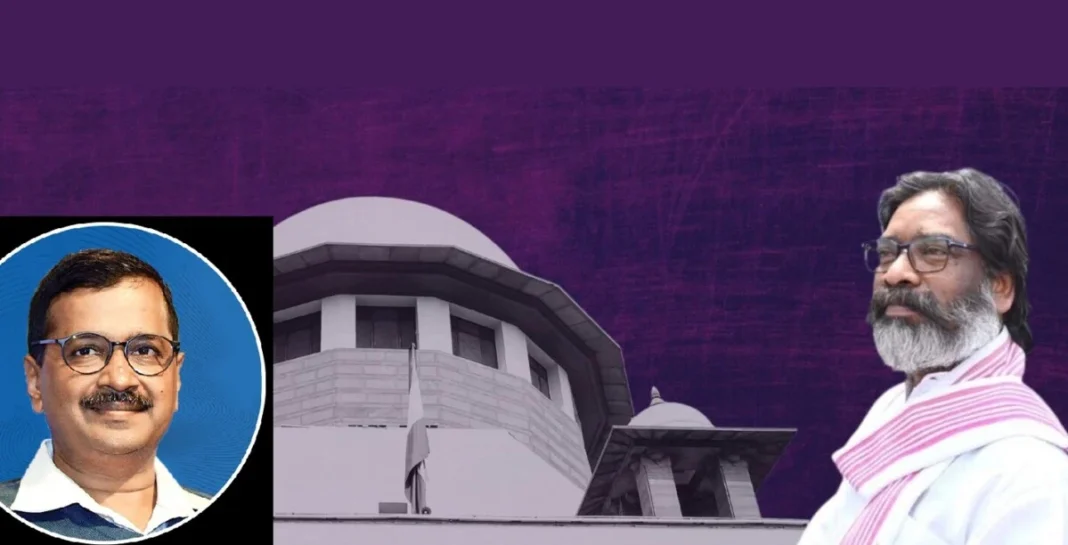Supreme Court’s Contrasting Decisions in Arrested Chief Ministers’ Cases Spark Debate
Ahmed Alam
NEW DELHI: In a recent turn of events, the Supreme Court’s decision to grant interim bail to Delhi Chief Minister Arvind Kejriwal for election campaigning has raised questions about the judicial system’s consistency. This decision stands in stark contrast to the dismissal of a similar petition by former Jharkhand Chief Minister Hemant Soren. Both leaders are facing legal action under the Prevention of Money Laundering Act (PMLA), yet their treatment by the judiciary has been notably different.
Hemant Soren, arrested by the Enforcement Directorate (ED) on January 31 in connection with an alleged land scam in Jharkhand, has been vocal about what he terms a “political conspiracy” against him. Despite his assertions and the absence of concrete evidence, Soren remains incarcerated, with his bail plea still pending after almost four months.
During a recent hearing in the top court, where Soren’s petition challenging his arrest was under consideration, the apex court expressed unwillingness to entertain the plea. Senior Advocate Kapil Sibal, representing Soren, informed the court of his decision to withdraw the petition, indicating that Soren’s release remains uncertain for the time being.
The disparity in treatment between Kejriwal and Soren has not gone unnoticed. While Kejriwal, facing allegations in an alleged liquor scam case in Delhi, was granted conditional bail by the Supreme Court to campaign during the general elections, Soren’s plea for similar relief was rejected. Legal experts and commentators have pointed out the inconsistency in the court’s approach toward the two cases.
Sanjay Hegde, a senior advocate, highlighted the importance of ensuring a level playing field during elections. He remarked, “The main reason for granting bail to Kejriwal was that you cannot conduct free and fair elections by keeping a significant player out during the elections. On logic, they should have given bail to Hemant Soren also, even if he could campaign only for a week.” Hegde emphasized the need for consistency in judicial decisions, especially in cases with similar circumstances.
The sequence of events in both cases illustrates the contrasting paths taken by the respective Chief Ministers in seeking legal recourse. Kejriwal, arrested on March 21 in the alleged liquor scam case, chose not to file a petition for regular bail, asserting the illegality of his arrest instead. The Delhi High Court rejected his plea, prompting him to approach the Supreme Court, which ultimately granted him conditional bail.
In contrast, Soren, arrested on January 31 and accused of illegally possessing land in Jharkhand, pursued legal avenues diligently. Despite his efforts, including filing a bail petition before the PMLA court in Ranchi, his plea was rejected, leading to the subsequent dismissal of his petition by the Supreme Court.
The Supreme Court’s decision to grant bail to Kejriwal, citing the significance of the general elections, underscores the court’s recognition of the role political leaders play in the electoral process. However, the denial of similar relief to Soren raises concerns about equitable treatment under the law.
As the legal proceedings unfold, the debate surrounding the disparate treatment of the two Chief Ministers continues, with implications for the broader discourse on judicial consistency and fairness in the Indian legal system.

